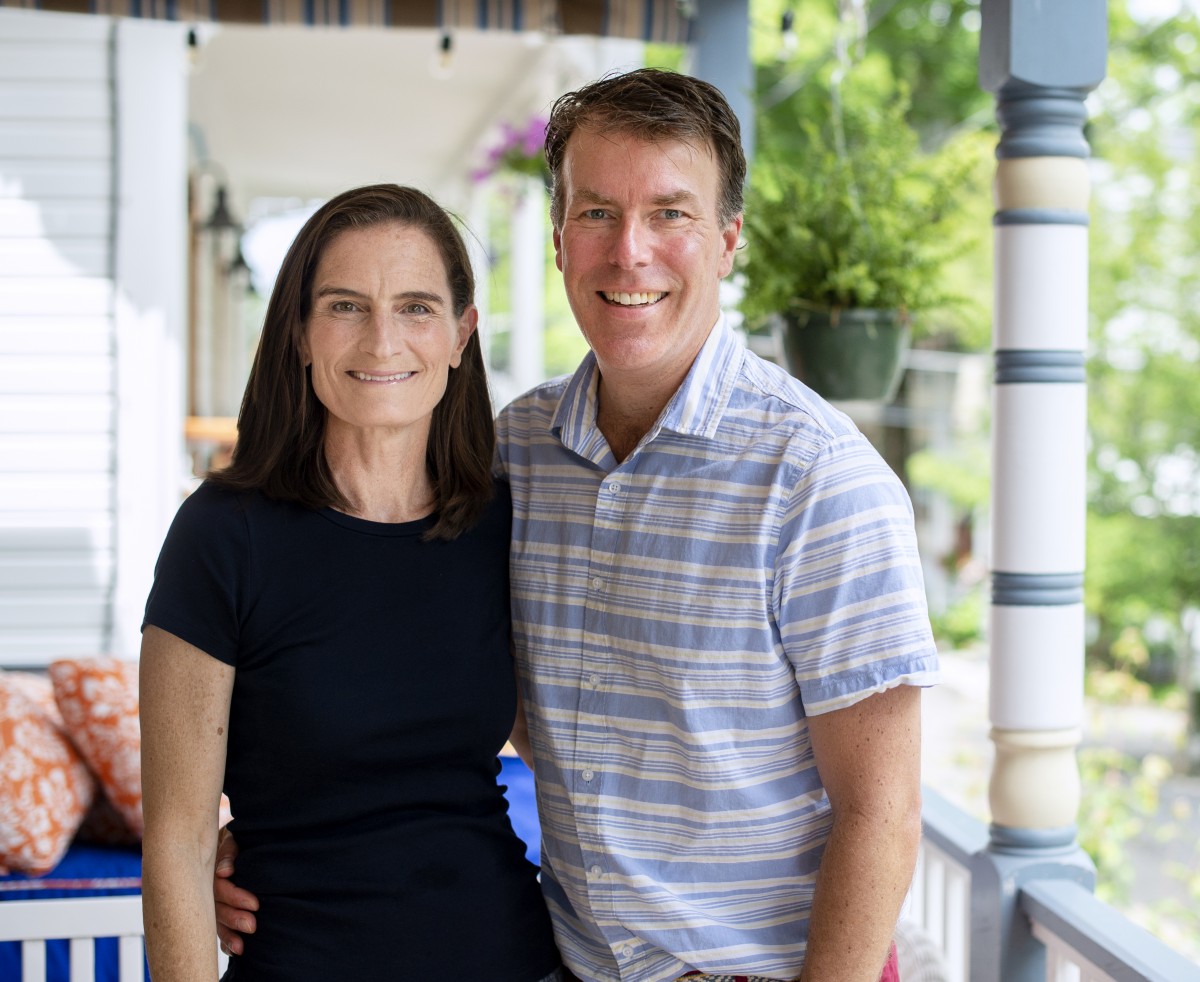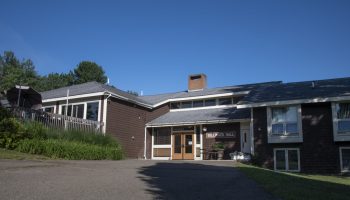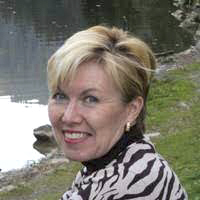
The Edward L. Anderson Jr. Foundation has been offering various innovative fundraising programs to support Chautauqua since 2014. Under the direction of brothers Dave and Steve Anderson, the foundation offered some variations on this theme in 2018.
Dave Anderson is a member of the Chautauqua Foundation board of directors. An advocate of entrepreneurial nonprofit thinking, he and his wife, Deirdre, may see fundraising through a somewhat different lens than some. The Andersons spoke to the Daily on the porch of their family condominium within easy hearing distance of the Amphitheater.
Dave, talk about yourself and Chautauqua.
Dave: I started coming to Chautauqua in 1972 when I was 5 years old. I am a Children’s School graduate. I would come with my father and his dear friends Dick and Nancy Bechtold. Dick and my father served together on the Chautauqua Foundation for many years. The Bechtolds were often overseas, so we came a week at a time, and this was where we could all meet up. I think my father bought this place in 1995 after the building was remodeled. Deirdre and I visited when we were dating, and she fell in love with Chautauqua. We have been returning ever since. We have three kids, all of whom love Boys’ and Girls’ Club. We spend as much time here as we can.
Where did you meet?
Deirdre: Dave and I met at a wedding in Colorado. Dave went to high school with three people that I went to college with. I was living in San Francisco at the time, and Dave was living in Colorado. After meeting at that wedding, we were long distance for two years in the late 1990s. Until I went to Chautauqua to meet his dad, I didn’t want to like Chautauqua. I wanted us to vacation where I spent my summers, at Lake Sunapee, New Hampshire. I remember after I arrived here, my parents asked what it was like. I told them the lecture is to Chautauqua what the cocktail is to Lake Sunapee. My dad passed away earlier in the year when he was going to make his first visit to Chautauqua, but my mom has visited several times. I feel very grateful to have met Dave and to be here by marriage.
Your kids are with you in Chautauqua. I guess I expected a house.
Dave: I’ve been coming to this condo for over 40 years and it has such memories, such significance for me and for my family. We do love it, and it’s bigger than it looks. And we never have to leave the porch where we are sitting to hear the program at the Amp. It is a special location.
I will say that a lot of whatever position I enjoy at Chautauqua comes from the generosity of my father in setting up the Edward L. Anderson Jr. Foundation, which has benefitted Chautauqua in many ways. He was asked by the Development Office to take over the Scholar in Residence program prior to his death in 2012, and he was very pleased to do so.
Deirdre: I remember Ed telling me, “We’re not white tablecloth people. We’re more strip mall restaurant people.” Dave’s family was not fancy, and I guess we aren’t, either.
When our kids were little, and Ed would be here in this apartment, we would rent a place on Miller Park where things were quieter. Happily, at that time, Miller Park-area home ownership turned over and there were lots of kids the age of our kids. We made some lasting friendships with neighbors over that period.
Now you spend most of your year near Boston.
Dave: Yes, I work for a small investment firm there. It’s actually a firm I started with my father and another partner. We didn’t know it at the time, but when we started the firm, my father only had six months to live. We have been proud to carry it on. My father was way ahead of his time in so many ways. Decades before Fitbit and smoothies, he was measuring his activity and preparing nutritious fruit drinks.
Deirdre: When we were married, I was working in publishing and Dave was in the dot-com world. We lived in Seattle then, and when he got a little tired of the world of educational technology, he said he had always wanted to learn the investment business, the strategy and philosophy of it, from his dad. And they got to do that together for six months via Skype before Ed passed. Ed would be enormously proud of what Dave and his partner have built with the firm they started together.
And what my modest husband isn’t saying is that when we moved to the Boston area, we moved to Hingham and bought my parents’ house, and my mother lives with us now. That has enabled us to be closer to my extended family, and we are both very involved in our town — Dave on the town financial advisory board and me on a transportation committee, and I’m the head of our town’s historical society. I could not have done all this without Dave’s support. He comes from a long line of feminists. And he mostly works from home, and I love that, too.
Was it love at first sight for you?
Dave: Well, I guess it pretty much was. And as I got to know Deirdre, I so wanted her to love Chautauqua, and she has. It seems to me that no matter what age you are, there is something here for you. From my 10-year-old to my mother-in-law to my father to everyone in between, there’s a powerful connection with Chautauqua. Each would describe this place differently, yet each finds something new to love nearly every season. It’s still hard for me to describe, as it is for everybody. When you bring friends here, they can paint their own picture of the place.
It seems that many people at Chautauqua did arrive here as guests of friends, unless they inherited Chautauqua from their family.
Dave: I do think it would be tough to find a Chautauquan who just stumbled onto this place. But if I did, it would be amazing to learn of their impressions and how they evolved. We’re almost always surprised by friends’ reactions to Chautauqua. Every time we think a family will adore the place and buy a home here, they don’t for one reason or another. Usually there is too much else going on in their lives. And the reverse is true, too. I’ve given up predicting.
I know that your father was a significant supporter of Chautauqua. Were you recruited to the foundation board?
I guess my role just kind of evolved as I spent time with, especially, Geof Follansbee and Tina Downey, working on ways to create a bigger financial pie for the Institution. I had actually worked for the Nature Conservancy, which I think now operates in 72 countries and has conserved 100 million acres worldwide, both before and after I attended business school. I’m pretty sure I was the only member of my business school class who didn’t know where the recruiting office was. I knew I was going back to the conservancy after getting my MBA.
After business school, I became intrigued with a different concept for the Nature Conservancy. Historically, since it was founded in 1951, the conservancy had raised money to buy land to conserve it. We began tinkering with a different wrinkle. For example, suppose you were interested in buying a ranch in Montana. As a Nature Conservancy rep, I could work with you and suggest that you buy the ranch with limited development opportunities for the property. We would sign a document together to that effect. In the end, you would get ownership of the property, might get a tax benefit and that property would be protected. And the conservancy would not have had to raise the money to buy the property. That’s just a rough outline of the arrangement, but you can see that it enables the conservancy to expand land protected from harmful development without the need to raise funds to purchase it.
This got me intrigued by the notion of creating a bigger impact by means of such partnerships or fund matches, or even in other ways. If I give a dollar and Deirdre gives a dollar and you give a dollar, then we have three dollars versus my one.
In talking with my brother Steve, who lives on the West Coast, we became interested in this matching grant strategy for Chautauqua as a means of leveraging and expanding the reach and impact of our foundation’s contributions.
If you gave more than previously, we would match the amount of increased giving. If you hadn’t given before, we would match anything you chose to donate. The Institution has had some success with this program this year.
It sounds like you adopted a best practice from the conservancy and modified it for application here.
Dave: Yeah. We knew at the conservancy that we couldn’t protect every piece of property we wanted to by buying the land, so we had to adapt. It’s partly about thinking differently about raising money.
We are trying to enhance the power of someone’s gift through the matching mechanism. It may help to look at it this way: If you give an extra $100 to the Chautauqua Fund and we match it, the fund has gained $200 for what amounts to $100 worth of work. I find that compelling. It can be appealing to people to be able to do more for Chautauqua than just the amount they give.
There is an attraction in the idea of a donation mechanism that is not subject to established threshold limits. Doesn’t that open the door more widely to potential donors?
Dave: Absolutely. No gift is unimportant. Everyone’s participation is important. Almost everyone who worked at the conservancy donated, even though the salaries were not high. When we offer a matching gift, people can see their donation as that much more important. I can respect someone not being able to reach a threshold and then not giving. With the match, there is another way.
And I love the idea of a donor signing up for what might seem like a small monthly draw on a credit card. It’s not a big gift, month over month. But over a year, maybe it’s something. And I give money myself that way. I donate $25 a month to a public radio station we love in Seattle. And until I cancel that monthly draw on my credit card, the station has some funding it needs to expend no further effort to raise.
What did you do after college?
Dave: I went to a small investment bank in Chicago. But my brother — who has a Ph.D. in ecology and, like me, spent a lot of time in nature with my father — and I have always had an affinity for the Nature Conservancy. So I wound up there pretty quickly.
I was strongly drawn to the concept of entrepreneurial nonprofit work. I have worked with Echoing Green, an organization that supports social entrepreneurship and leadership development programs.
Are you conscious of thinking about philanthropy in perhaps new and different ways?
Dave: Not necessarily. I will say that I certainly learned from my father not to allow limits to how I think about things. There weren’t restraints on our imagination when we were kids. And we had a degree of financial security. So now we’re trying to leverage that good fortune in ways that help institutions we passionately believe in.
Being with like-minded people in a room, whether it’s here or at the conservancy or at home in a town meeting, is uplifting. You’re all engaged in something bigger than yourself that maybe has some broader meaning. It’s always nice to know there are other people pushing with you in the same direction.
I do think that engagement with an institution, like Chautauqua, for example, breeds more engagement with that institution. So, the value of attracting new donors, at whatever level, is obvious.




